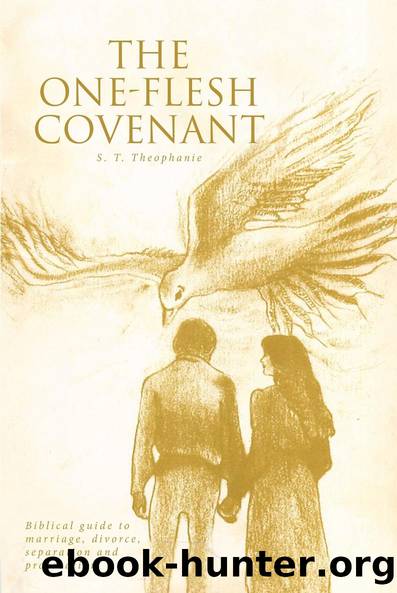The One-Flesh Covenant by S. T. Theophanie

Author:S. T. Theophanie [Theophanie, S. T.]
Language: eng
Format: epub
Tags: Social Science, Abortion & Birth Control
ISBN: 9781644589199
Google: -Zh8xgEACAAJ
Publisher: Christian Faith Publishing, Incorporated
Published: 2019-05-10T04:16:10+00:00
Chapter 3
Separation
Jesus forbade the divorcing of a lawful spouse for any cause but sanctioned separation from one who was unrighteous. Works of unrighteousness (defilement or uncleanness) are identified in 1 Cor. 6:9, 10; Gal. 5:19â21; and Eph. 5:3â5. As shown in the following scriptures, they originate in the heart:
xxxxx
âBut those things which proceed out of the mouth come forth from the heart; and they defile the man. For out of the heart proceed evil thoughts, murders, adulteries, fornications, thefts, false witness, blasphemies: These are the things which defile a man: but to eat with unwashen hands defileth not a manâ (Matt. 15:18â20).
âAnd he said, that which cometh out of the man, that defileth the man. For from within, out of the heart of men, proceed evil thoughts, adulteries, fornications, murders, Thefts, covetousness, wickedness, deceit, lasciviousness, an evil eye, blasphemy, pride, foolishness: All these evil things come from within, and defile the manâ (Mark 7:20â23).
xxxxx
A father in Old Testament times had the authority to separate his daughter from the man with whom she had entered into the one-flesh covenant; that is, to prevent her from abiding in the married state with him:
xxxxx
âAnd if a man entice a maid that is not betrothed, and lie with her, he shall surely endow her to be his wife. If her father utterly refuse to give her unto him, he shall pay money according to the dowry of virginsâ (Exod. 22:16, 17).
xxxxx
However, he did not have the authority to loose her from him. No one can loose what Godâs word has bound (Matt. 19:6 and Mark 10:9). As marrying someone other than the person with whom the one-flesh covenant was established carried the penalty of death by stoning (Deut. 22:13â21), this left a daughter, as was shown in Chapter 2, with no alternative but to remain single and celibate, the requirement necessary to satisfy the justice of the law for having submitted herself to a man who was judged unacceptable for marriage by her father. The fatherâs reason for not accepting the man was due to his uncleanness (unrighteousness).
Reflect on Gen. 34:1â31, the account of Jacobâs daughter Dinah and Hamorâs son Shechem. When Dinah âwent out to see the daughters of the land (Gen. 34:1), Shechem, the Hivite, âtook her, and lay with her, and defiled herâ (Gen. 34:2). This action, like unto that described in Deut. 22:28, 29, established a one-flesh covenant union. However, Shechem was not circumcised. Under the New Covenant, âCircumcision is nothing, and uncircumcision is nothing, but the keeping of the commandments of Godâ (1 Cor. 7:19). Under the Old Covenant, however, circumcision was crucial. To be uncircumcised was to be unclean. Shechem, not having been circumcised, was judged unclean, guilty of defiling Dinah, and unacceptable for marriage by Simeon and Levi, Dinahâs brothers.
Shechemâs soul clave unto Dinah, and he loved her. Desiring to abide in the married state with her, he consented to be circumcised. His father and all of the males of the city did likewise in order to become âas one peopleâ through their marriages with the daughters of Jacobâs people.
Download
This site does not store any files on its server. We only index and link to content provided by other sites. Please contact the content providers to delete copyright contents if any and email us, we'll remove relevant links or contents immediately.
The Secret Power of Speaking God's Word by Joyce Meyer(3163)
Signature in the Cell: DNA and the Evidence for Intelligent Design by Stephen C. Meyer(3123)
Real Sex by Lauren F. Winner(3006)
The Holy Spirit by Billy Graham(2939)
The Gnostic Gospels by Pagels Elaine(2518)
Jesus by Paul Johnson(2351)
Devil, The by Almond Philip C(2324)
23:27 by H. L. Roberts(2245)
The Nativity by Geza Vermes(2226)
Chosen by God by R. C. Sproul(2159)
All Things New by John Eldredge(2156)
Angels of God: The Bible, the Church and the Heavenly Hosts by Mike Aquilina(1951)
The Return of the Gods by Erich von Daniken(1927)
Angels by Billy Graham(1920)
Knowing God by J.I. Packer(1849)
Jesus of Nazareth by Joseph Ratzinger(1802)
The Gnostic Gospel of St. Thomas by Tau Malachi(1781)
Evidence of the Afterlife by Jeffrey Long(1776)
How To Be Born Again by Billy Graham(1775)
